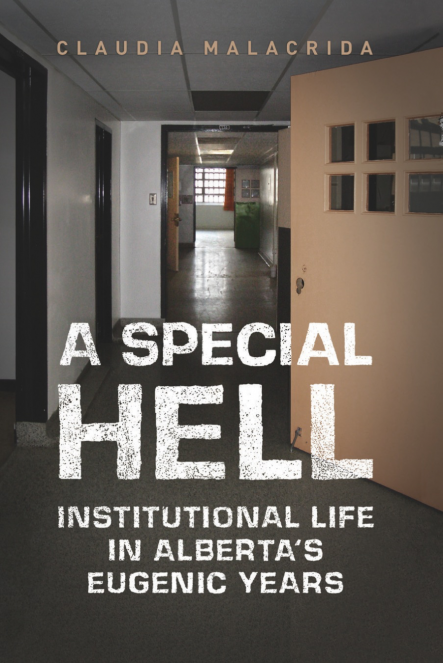
Dr. Claudia Malacrida’s A Special Hell: Institutional Life in Alberta’s Eugenic Years
Claudia Malacrida draws on rare oral history interviews with former inmates and workers as well as archival documents to illuminate the dark history of how people deemed ‘mentally defective’ were treated in twentieth century Alberta, Canada. Focusing on Provincial Training School (PTS)/Michener Center in Red Deer, this sobering account examines how institutionalization and eugenics operated hand in hand. Institutionalization at PTS/Michener Center served as a form of passive eugenics by sequestering children and young adults away from their communities, often into advanced adulthood, sometimes until death. More active eugenic forms operated at PTS/Michener as well. The Alberta Eugenics Board met regularly in the institution, and the largest number of eugenic surgeries under Alberta’s Sexual Sterilization Act (1928-1972) were imposed on PTS/Michener’s inmates.
Institutionalization was also a political response to social issues such as poverty and family breakdown, pressures in absorbing immigrant families into the social fabric of a newly-developing nation, and the inability of public education to accommodate children who learned differently. While economic concerns and educational failure drove institutionalization, once children became interned, they were rarely offered any ‘special’ education and instead, under the guise of vocational rehabilitation, were made to work for little or no pay to maintain their upkeep and keep the institution running. The ‘success’ of this model resulted in huge institutional growth, chronic crowding and terrible living conditions that included both routinized and extraordinary violence.
Malacrida’s current engagement with community members extends beyond historical eugenics and moves to what she terms ‘newgenics’. She has been collecting life stories and more focused interviews with disabled people across Alberta for the past five years, to explore their successes and the barriers they face in achieving rewarding relationships, sexuality and (if wanted) family lives. Her webpage makes connections between the historical work and the current research, and can be viewed at www.eugenicsnewgenics.com